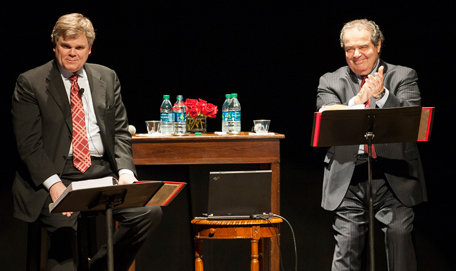© 2013 The Texas Lawbook.
By Mark Curriden, JD
Senior Writer for The Texas Lawbook
Antonin Scalia is misunderstood. Liberals hate him. Conservatives mislabel him. Politicos radicalize him. Judges misquote him. The president pans his opinions in State of the Union addresses.
Oh, and he scares little children by screaming at them for believing that we have a “living Constitution.”
No, that last one is not right. But the US Supreme Court justice wouldn’t mind yelling at a few teachers and parents for telling their kids “such nonsense.”
Love him or hate him, Justice Scalia is brilliant, engaging and thought-provoking. He’s also quite the entertainer on stage. He’s the justice with whom you would most want to have beers… or an Italian feast.
He’s Bill Clintonesque. And misunderstood.
Last week, Justice Scalia spent two days on the SMU Dedman School of Law campus. He taught three classes and took private time to meet with students and faculty – a treat for any law school.

The highlight of his visit took place Monday evening, when more than 1,500 lawyers, judges, scholars, students and fans gathered at SMU’s McFarlin Auditorium for an old fashioned book reading by Justice Scalia and his co-author, Dallas’ own Bryan Garner, who holds the title of Distinguished Research Professor at SMU Dedman. The pair has a new book out called Reading Law: The Interpretation of Legal Text.
Snoozer, right?
Wrong.
I planned to write about Justice Scalia and Garner’s presentation last week immediately after the lecture, but I held off to read the book. The duo did selected readings from it and I found myself wondering, did they pick out the only interesting parts or could this be a page-turner?
Let me state for the record that if I was stuck on a cold deserted island off the coast of Alaska, I would want this book with me. After all, it is 608 pages long and could keep a fire going for days.

“Words are to be understood in their ordinary, everyday meaning,” said Justice Scalia, pointing out that the word “running” has many different uses. “It is up to the judge to determine which meaning is valid.”
While the book is good, the live version of Justice Scalia and Garner was so much better. For more than 90 minutes, the duo talked about whether roosters are animals, death ray technology, whether the Constitution is living or dead and a lengthy discussion of what the meaning of “into” is (see, I told you he is Clintonesque).
“My political beliefs are greatly different from Justice Scalia,” Garner told the audience, receiving a splattering of applause. “I deplore the Second Amendment. I’m in favor of gun control. I favor gay marriage.
“We worked through 700 decisions and we have yet to find a single decision with which we disagree [with each other],” said Garner, who is truly one of Texas’ hidden legal treasures.
“I had to bring you kicking and screaming,” replied Justice Scalia. “You are a bleeding heart.”
Garner is the editor of Black’s Law Dictionary and the author of more than 20 other books. He reportedly has one of the best home libraries in Dallas, though I didn’t attend the private reception he hosted for Justice Scalia and SMU Dedman alumni elite because they didn’t invite people who go to such receptions for the free alcohol.
Reading Law is Garner and Justice Scalia’s second book. They penned Making Your Case: The Art of Persuading Judges in 2006. Immediately afterward, Justice Scalia told Garner he was “tired and exhausted of book writing” and didn’t think he wanted to do another such project.
Only a year later, Garner’s phone rang.
“I miss you,” Scalia proclaimed.
During the next three and a half years, the duo spent more than 200 hours working side-by-side. They also had the help of eight SMU Dedman law students, who worked with Garner researching cases.
“We have a wonderful relationship,” Garner says of his time with the justice. “We would work for hours, going through cases, and then go out for dinner and keep on talking.”
One of those cases came from the Kansas Supreme Court, which once upon a time not so long ago ruled that roosters are not animals so as to not decide that cockfighting violated animal cruelty laws.
“That’s just crazy,” Justice Scalia said. “Judges should look for the clearest, most reasonable meaning. Words change over time. That’s why words must be given the meaning they had when they were adopted.”
Garner noted that law schools “don’t teach this stuff.”
“It’s one of my problems with legal education,” Justice Scalia cut in. “They teach common law, but they don’t teach textual interpretation.”
Justice Scalia pointed out that every law – indeed, every constitutional amendment – can be reversed or modified. Pausing, he said he thought one of the amendments states in its text that it cannot be reversed, but he couldn’t remember which one.
“Every state has two senators,” Dean John Attanasio spoke up from the front row.
“That’s it,” Justice Scalia responded. “Of course, he knows. He’s the dean.”
Justice Scalia and Garner then took a minute to honor Dean Attanasio.
“Without him, we wouldn’t be here,” Garner said.
“I wouldn’t be here if not for you, John,” Justice Scalia added, leading an applause.
It was clear that the duo meant the moment to demonstrate their public support for Attanasio, who it was announced earlier in January would not be back as dean of the law school after the end of this school term.
The nation’s longest serving Supreme Court justice said he also wanted to correct the false notion that words must be strictly construed.
“I’m not a strict constructionist,” he said. “You don’t want to interpret laws strictly. You want to read them reasonably.”
Another Scalia pet peeve: “The false notion that the spirit of a statute should prevail over its letters or plain language,” he said. Don’t even get him started on legislative intent.
The Constitution, Justice Scalia said, is not there to do good or to reach favorable or specific results.
“The judge who always likes the result he is reaching is a bad judge,” Justice Scalia said. “It means he’s doing something wrong.”
As Justice Scalia laid down his legal principles, I caught myself mentally recalling his written opinions, thinking I could catch him in a contradictory position. Just as reasonable proof of his hypocrisy seemed within reach, he threw a dirty bomb into the conversation: the “living Constitution.”
“I hate that term,” Justice Scalia told the crowd, noticeably coming off his stool for the first time all evening. “I have school children come to the court and they repeat what they’ve heard, that the Constitution is a living document.
“It’s not a living document,” he continued. “It is dead, dead, dead.”
Justice Scalia paused as the audience laughed and applauded.
“I can do better than that,” he added. “It is an enduring document. Once you buy into the ‘living Constitution,’ you have invested your life to nine Harvard and Yale lawyers. The notion of a living Constitution is so contrary to the notion of a democratic institution.”
The evening ended with Justice Scalia and Garner signing a few hundred books for those attending.
If there was one flaw in the evening, it was self-inflicted by Justice Scalia. I would love to be able to recommend that you check out the event for yourself by clicking on the SMU Dedman website to view the full video. It would be educational and entertaining for all who see it.
One problem: it wasn’t recorded. Justice Scalia reportedly didn’t allow it. He didn’t want any television cameras and no recording devices. Anyone claiming that a newspaper didn’t print a long enough article or didn’t publish Justice Scalia’s complete quote needs to first answer why they didn’t vigorously advocate for a full and public recording of the event.
The event was terrific. Most of those attending got their first Bryan Garner experience and they were overwhelmingly impressed. They also got to witness Justice Scalia at his best.
Unfortunately, the benefits are forever limited to the 1,500 in McFarlin Auditorium last week.
Justice Scalia is sometimes misunderstood. And some of those times, such as this, he has no one to blame but himself.
© 2013 The Texas Lawbook. Content of The Texas Lawbook is controlled and protected by specific licensing agreements with our subscribers and under federal copyright laws. Any distribution of this content without the consent of The Texas Lawbook is prohibited.
